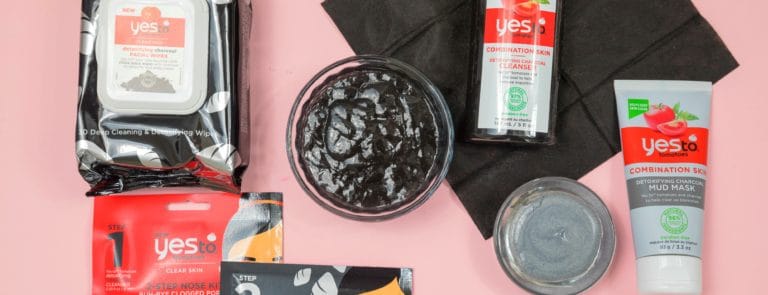15% off €35 OR 20% off €45
Skin care 101 – the beginner’s guide
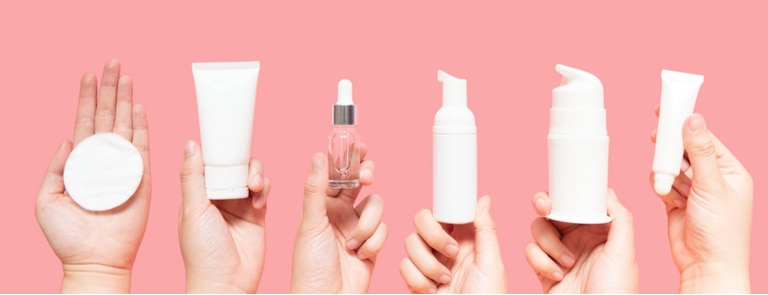
Skincare can be a confusing world. The truth is – there’s a lot out there which you don’t really need.
However, there are certain habits and ingredients which are highly beneficial for your skin. These things can help protect against premature ageing, dryness and discolouration.
This guide will introduce you to the basics including skin care tips, our top 10 products and eight hero ingredients to look out for.
Remember, it’s never too soon – or too late- to start taking care of your skin.
Why is it important to look after our skin?
Your skin is a hard-working organ. It acts as a flexible, dynamic barrier between our bodies and the outside world. Your skin keeps you protected from cold, heat, UV rays, germs and general damage.1
The skin is a wonderfully durable material, which puts up with a lot throughout the course of our lives. However, just like a fabric, it needs to be cared for to stay in good condition.
The skin on our face is particularly delicate. The face is where ageing shows up the most, as well as where signs – such as dehydration - are most obviously reflected.2
Taking care of your skin is important to maintain the optimum health of your skin and keep it looking and feeling its best.
What’s my skin type?
Using a product designed for your skin type is important. This will ensure your skincare contains the right ingredients for your particular skin needs.
Skin types are broadly categorised as follows:3
Dry
Dehydrated and surface-dry, especially around the cheeks. May be flaky and prone to dullness and tightness.
Oily
Excess sebum (oil) production around the nose, chin and forehead. Can be prone to spots, large pores and acne.
Combination
Excess sebum production around the nose, chin and forehead with dry cheeks. May also be sensitive.
Sensitive
Reacts easily to products, sunlight and touch, prone to redness, itchiness and dryness.
Normal
Even tone and texture with neither excess sebum production nor dryness.
5 skin facts
- Your skin is made up of three layers – the epidermis, dermis and subcutis.
- Your skin weighs between 3.5 and 10 kilograms (7.5 and 22 pounds) and has a surface area of 1.5 to 2 square meters, depending on your height and body mass.4
- Men generally have thicker skin than women do.
- The epidermis constantly renews itself, with new skin cells moving to the surface within four weeks.
- A square inch of skin holds about 19 million cells.5
Our top 10 skincare products
1. Cleanser
The cornerstone of your routine. Cleanse 1 – 2 times per day (but no more). Always cleanse in the evening before bed to remove the day’s oil and dirt from the skin.
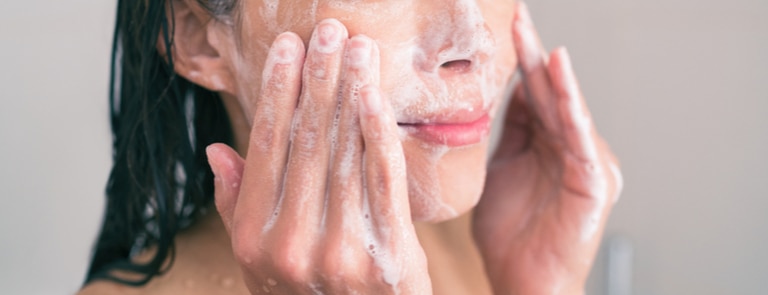

Choose from:
- Foaming cleansers - such as gels and foams – which are rinsed off with water. Suitable for normal, combination and oily skin.
- Cleansing oil – which is massaged into the skin and removed with water or a warm damp cloth. Suitable for normal, dry, combination and sensitive skin.
- Cream cleansers – which are taken off with a cotton pad or cloth. Suitable for normal, sensitive, dry and combination skin.
- Clay-based cleansers – which come off best with a warm cloth. Suitable for oily, normal and combination skin.
2. Moisturiser
Everyone should use a moisturiser – including those with oily skin. Moisturiser helps supply and seal in moisture to the skin, which helps promote a healthy skin barrier.
Oily skins should avoid occlusives – moisturisers which sit on top of your skin and can block pores (think coconut oil and petroleum jelly).
3. Sunscreen
A non-negotiable product for your skincare routine.
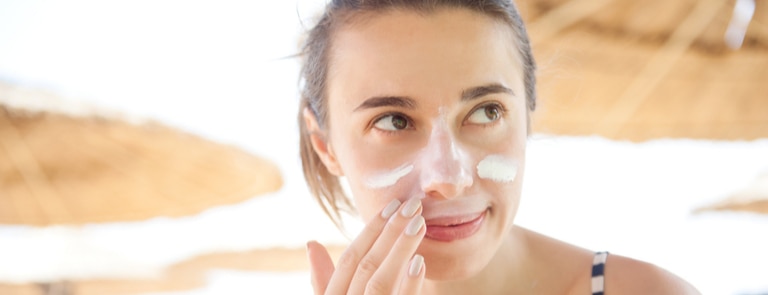

UV rays account for up to 80% of skin ageing, plus going unprotected significantly increases your risk of developing skin cancer.6 Wear at least a broad spectrum SPF 15 or higher, SPF 30 or higher for a day outdoors.7
Chemical sunscreens are good for oily, combination and normal skin types – dry or sensitive skins should choose mineral sunscreens.
4. Face oils
A rich facial oil forms a soothing, protective layer for the skin and helps seal in moisture.
Use an oil at night, after moisturiser and/or serum. This will enable the oil to seal in the other products and soften the outer layer of skin.
5. Serums
Not to be confused with a moisturiser, serums penetrate the top layer of skin.
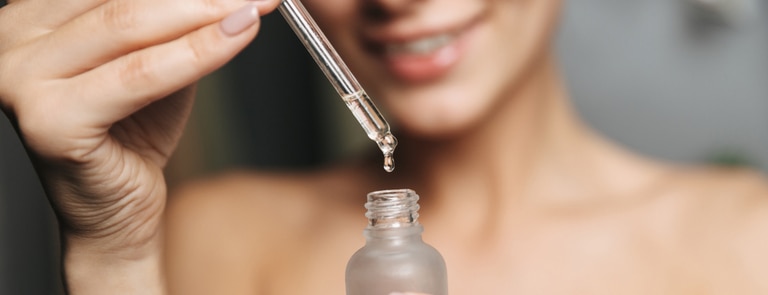

They are a way to get concentrated, active ingredients (like vitamin C) into the skin.
Use before moisturising.
6. Toners
Toners come in sprays, mists, tonics and lotions, and they’re great to use after cleansing to help sweep away dead skin cells and restore the natural pH of your skin.
7. Face masks
Masks can either be clarifying or hydrating.
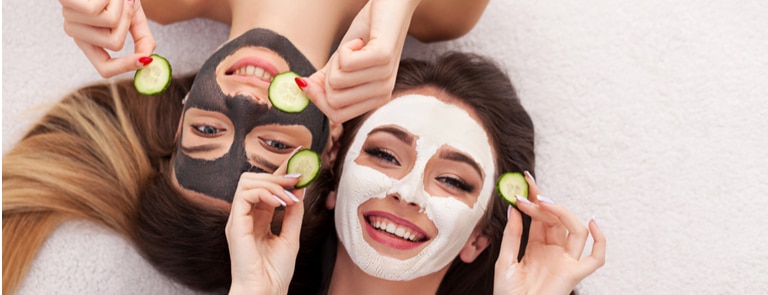

Clarifying masks draw dire and impurities from deep within your pores (e.g. clay or charcoal masks). Hydrating masks (like sheet masks which are full of ingredients like hyaluronic acid) deliver intense nourishment to address dry skin.
Use once a week on cleansed skin.
8. Exfoliators
Forget about harsh physical scrubs – the new era of exfoliators are gentle acids including glycolic and salicylic acid, which slough off the top layer of dead skin cells and deep clean pores, leaving you glowing.8
Use after cleansing, once a week initially, then more frequently when your skin adjusts. Always wear SPF when using chemical exfoliators – the new, baby-soft skin you’ve revealed is very delicate.
9. Eye cream
Specially formulated for the thinner skin around your eyes, eye creams are designed to tackle puffiness and dark circles.


Ingredients like caffeine and peptides help to make the skin look fuller. An eye cream also helps tackle dehydration and fine lines and wrinkles.
10. Micellar water
Micellar water is a gentle and highly effective cleanser and make up remover.
It’s made from pure water infused with minuscule droplets of cleansing oil. These droplets pick up and absorb impurities and dirt on your skin’s surface, which you then sweep away with a cotton pad leaving a perfectly cleansed face.
Ingredients to watch out for
These ingredients are superheroes of the skincare world.
-
Vitamin C
A potent antioxidant, vitamin C has collagen-stimulating effects at the right concentration (above 5%), helps protect skin from UV damage and is effective at addressing the first signs of ageing (including pigmentation and fine lines).9
-
Vitamin E
An antioxidant, vitamin E helps protect the skin from UV damage and helps seal in moisture, leaving skin supple and hydrated. This is why vitamin E is used in so many anti-ageing products.10
-
Hyaluronic acid
A substance found naturally in the skin, hyaluronic acid is a humectant which attracts and holds water.11 This translates as plumper, hydrated and dewy looking skin.
We have plenty of hyaluronic acid when we’re young, but it gradually declines with age. Find it in serums, eye creams and masks.
-
Glycolic acid
Also known as an alpha-hydroxy or fruit acid, this natural acid penetrates the top dull, flaky layer of skin cells and exfoliates them to reveal healthy new ones.12
Go slow to start with – use once a week and gradually build up use. Always use an SPF when using acids.
-
Salicylic acid
A safe and effective acid peel, salicylic acid is a hydroxy acid.
Much like glycolic acid, it has a mild exfoliating effect that renews and refreshes the top layer of skin and can help fight signs of ageing.13
-
Retinol
A vitamin A derivative, retinol is a potent exfoliating agent which is clinically proven way to improve skin tone and texture, including helping minimise fine lines and wrinkles.14
Start slowly with retinol to see how your skin reacts. Very sensitive skin might need to use a low concentration (0.01%) and build up usage to allow the skin to adjust. It’s vital to wear an SPF while using retinol.
-
Rosehip oil
Found in face oils, rosehip oil contains fatty acids and vitamins A, C and E – all associated with boosting skin health.
It is known to help fight redness and oxidative stress – both of which contribute to signs of ageing.15
-
Clay
Known for its cleansing and detoxifying properties in face masks, clay is also thought to boost collagen production.
One study found that clay application promotes an increase in the number of collagen fibres when used in conjunction with steam.16
DOs
- Wear sunscreen every day. If you only do one thing for your skin – do this
- Eat right for your skin – lots of protein, omega 3 fats, vitamins, minerals and fibre
- Invest in a silk pillowcase – it helps prevent skin dryness
- Drink water – at least 1.2 litres per day
- See a dermatologist if you have concerns about your skin
DON’Ts
- Over-cleanse – you’ll strip the natural oils and interfere with the skin’s barrier function
- Skip moisturiser if you have oily skin – this can lead to more oil production
- Use harsh physical exfoliators like sugar, salt or kernel scrubs on the face
- Pick your skin – it spreads infection and can lead to scarring
- Sleep in makeup or sunscreen – it blocks pores and causes blackheads and spots
Last updated: 6 April 2021
- https://www.ncbi.nlm.nih.gov/books/NBK279255
- https://www.ncbi.nlm.nih.gov/books/NBK279255/
- https://onlinelibrary.wiley.com/doi/pdf/10.1111/ced.12105
- https://www.ncbi.nlm.nih.gov/books/NBK279255/
- https://derm-specialists.com/skin-fun-facts/
- https://www.ncbi.nlm.nih.gov/pmc/articles/PMC4344124/
- https://www.skincancer.org/skin-cancer-prevention/sun-protection/sunscreen/
- https://www.ncbi.nlm.nih.gov/pmc/articles/PMC6017965/
- https://www.ncbi.nlm.nih.gov/pmc/articles/PMC5605218/
- https://www.ncbi.nlm.nih.gov/pmc/articles/PMC4976416/
- https://www.ncbi.nlm.nih.gov/pmc/articles/PMC3583886/
- https://www.ncbi.nlm.nih.gov/pmc/articles/PMC3875240/
- https://www.ncbi.nlm.nih.gov/pmc/articles/PMC4554394/
- https://www.ncbi.nlm.nih.gov/pmc/articles/PMC2699641/
- https://www.ncbi.nlm.nih.gov/pmc/articles/PMC5796020/
- https://pubmed.ncbi.nlm.nih.gov/22340693/


